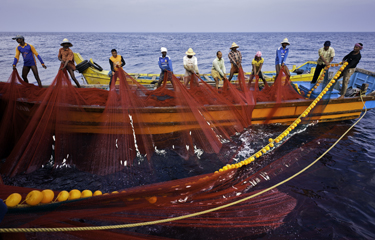India’s government has committed a financial support plan designed to help its fisheries sector survive the difficulties caused by the lockdown measures applied from 25 March to 18 May in response to the coronavirus.
The scheme is part of the relief package of more than USD 260 billion (EUR 239 billion) announced on 12 May by the government to mitigate impacts by the COVID-19 pandemic.
As part of the package, Finance Minister Nirmala Sitharaman on 15 May said more than USD 2.6 billion (EUR 2.39 billion) will be allocated via the Pradhan Mantri Matsya Sampada Yojana (PMMSY) program to support the integrated, sustainable, inclusive development of marine and inland fisheries. Of the total, around USD 1.45 billion (EUR 1.33 billion) will be used to fund marine, inland fisheries and aquaculture, with the remainder dedicated to fisheries infrastructure such as fishing harbors, cold chain, and market development, News18 reported on 15 May.
The allocation of funds for the fisheries sector is expected to create jobs for more than 55 million people and double India’s fisheries export value to around USD 13 billion (EUR 12 billion).
In a statement released on 18 May, India’s Central Marine Fisheries Research Institute (CMFRI) said the funds from the package may be channeled to help reform local marine fisheries. Fishermen are likely to be given assistance to modernize their fishing vessels by upgrading marine safety and navigation systems, such as VMS, and adding fish-finding technology, as well as increasing the ability and capacity of Indian fishing vessels to handle and store fish onboard hygienically.
According to CMFRI, the package may put priority on mariculture, particularly cage farming, given its ability to absorb large capital investments. Projects under consideration for funding include brood banks of marine fish, hatcheries, and auxiliary facilities for cage fish-farming.
“Mariculture and coastal aquaculture also has the potential to provide gainful employment to a section of the jobless return migrants from other countries,” CMFRI Director A Gopalakrishnan said. “Seaweed mariculture can get a [boost] from the proposed reforms in contract farming laws.”
Gopalakrishnan said additional funding may be allocated to upgrade landing centers and wholesale facilities.
“[The] financial package needs careful tinkering and strategic roll-out so as to achieve desired results in a sector that is severely battered by the prolonged COVID 19-induced lockdown and associated multiple ramifications,” Gopalakrishnan added.
Photo courtesy of Daniel J. Rao/Shutterstock







